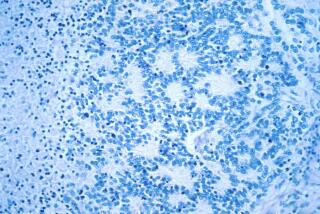Immune Systems Get Boost From New Drug : Medicine: San Diego studies help demonstrate the effectiveness of a bioengineered interferon in fighting infections.
WASHINGTON — A new drug has shown dramatic success in treating a rare, life-threatening immune-deficiency disorder and may prove to be a valuable therapy for numerous other immune disorders, federal health officials said Wednesday.
Researchers at Scripps Clinic and Research Foundation in La Jolla and 12 other medical centers around the world said that regular injections of recombinant gamma interferon can prevent serious infections and other complications of chronic granulomatous disease, or CGD, a hereditary condition that afflicts about 4,000 people worldwide.
The scientists said they are hopeful that the drug could have widespread application for others with compromised immune systems, such as AIDS patients, newborns, those on cancer chemotherapy, the elderly and victims of burns and other traumas.
“These findings are important not only because they will help children with CGD,” said Dr. John I. Gallin, director of the division of intramural research for the National Institute of Allergy and Infectious Diseases and a principal investigator in the study, which involved 128 patients including one San Diego County boy.
“We know it clearly works in one disease,” he added, speaking at a press conference. “We are optimistic it will be useful in other diseases.”
The study, published in today’s New England Journal of Medicine, found that therapy with gamma interferon reduced the frequency of serious infections by about 70%, or twice as well as antibiotics, until now the major means of treating CGD.
The new drug, a bioengineered form of an immune-boosting substance produced naturally by the body, was approved for CGD therapy in December by the Food and Drug Administration after the agency had reviewed the study results. The drug is manufactured by Genentech Inc. of South San Francisco.
In patients with CGD, certain white blood cells called phagocytes, which are supposed to attack invading fungi and bacteria, fail to produce the hydrogen peroxide that kills the microbes. The inability to make hydrogen peroxide is caused by a defective protein in the cell, or the lack of that protein.
As a result, people with CGD are especially vulnerable to critical infections.
The condition also causes excessive inflammatory reactions, such as gingivitis (swollen, inflamed gums), grossly enlarged lymph glands and tumor-like masses called granulomas. Although the granulomas are not malignant, they can cause serious problems by blocking passage of food through the esophagus, stomach and intestines and by obstructing the urinary tract.
Before 1970, many children born with CGD did not live past age 10. Antibiotic therapy, introduced in the 1980s, helped reduce bacterial infections but had no impact on fungoid infections. Such infections often require lengthy hospital stays.
“All of us who participated in this study have all been compelled by the suffering of these children,” said Dr. R. Alan B. Ezekowitz of Children’s Hospital in Boston, another of the head investigators. This, he said, is “what made us come together in this effort.”
At Scripps, Dr. John T. Curnutte supervised a study in which he saw the lives of 30 children turned around by the therapy.
“Kids who have been in the hospital every two, three, four months, and have had several close brushes with death, now are going months and months and months without even a minor infection,” Curnutte said.
“It’s really a lot of fun to see. They just blossom out, just like a normal youngster--and, in some ways, they’re even more exuberant,” he said. “It’s like an adult with lead weights on their feet: You take those off, and the person’s got an extra bounce in his step.”
One of the children was Ramon Garcia, 11, of Chula Vista. His mother, Rosa, said that she noticed something was wrong with her son in his first year of life. “Ramon always seemed to have a very high fever. I didn’t even need to take his temperature; I could feel how hot his head was with my hand,” she said.
After years of suffering with serious infections, any one of which could have killed him, Ramon began taking interferon in 1988 at Scripps. Curnutte credits the drug with helping the boy to be free of infection today and helping him recover quickly from serious pneumonia during the study period.
Patients who participated in the study were randomly assigned to receive either injections of the drug or a medically worthless placebo three times a week. The average course of treatment lasted nearly nine months, during which time most of the patients were also given antibiotics.
Researchers said that the gamma interferon “markedly reduced the threat of infections.” Only 14 of 63 patients on the drug developed serious infections, compared to 30 of the 65 who were taking the placebo.
The total number of serious infections among all patients also differed significantly. There were 20 among those taking interferon, compared with 56 among those on the placebo, the researchers said.
But the most striking effects were found among the 52 patients who were younger than 10: Of those on the drug, 81% remained infection-free after one year, compared with 20% of the placebo group. The researchers said they did not know why the therapy was so effective in this age group.
The study patients who received the drug required one-third as many days of hospitalization for treatment of infections as did the placebo group, researchers said.
Until recently, most primary immune deficiency diseases were treated with antibiotics, gamma globulin to replace antibodies or bone marrow transplants for some forms of severe immune disorders, according to Marcia Boyle, president of the Immune Deficiency Foundation, a research and education organization.
“Physicians could only fight the infections . . . not the underlying condition,” Boyle said. “(This) . . . represents a significant advancement.”
Researchers said the drug was tolerated well by the study subjects and produced no adverse side effects.
Cathy Miles, of Ft. Collins, Colo., who has two sons, ages 7 and 4, with CGD, said that neither has been hospitalized for an infection since the treatments began.
“We’re very grateful for the interferon,” she said. “It’s made a big difference in our lives.”
Times staff writer Linda Roach Monroe contributed to this report.






